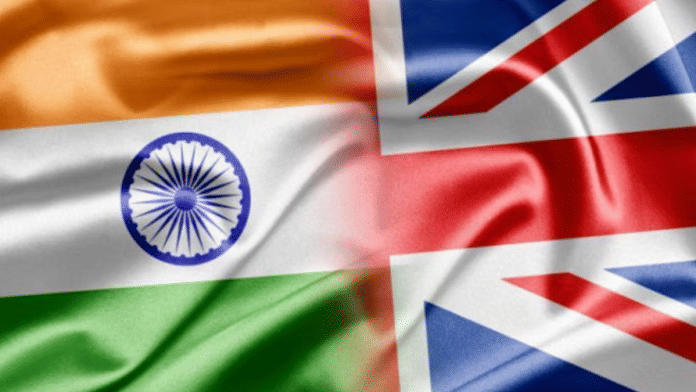New Delhi: Agriculture, textiles, plastics, marine products, chemicals and engineering goods are some of the sectors where Indian exporters are poised to gain from the India-United Kingdom free trade agreement that is to be signed Thursday.
The average tariffs on Indian goods in the UK, which is currently at 15 percent, is set to drop to 3 per cent once the FTA comes into force.
The agreement is expected to increase bilateral trade by around $33 billion annually, according to data published by London. The deal is considered by the UK as “India’s most comprehensive” ever while the most “significant” bilateral trade deal for London since it exited the European Union (EU).
“Our landmark trade deal with India is a major win for Britain. It will create thousands of British jobs across the UK, unlock new opportunities for businesses and drive growth in every corner of the country, delivering on our Plan for Change,” Prime Minister Keir Starmer said on the deal.
“We’re putting more money in the pockets of hardworking Brits and helping families with the cost of living, and we’re determined to go further and faster to grow the economy and raise living standards across the UK.”
The deal is set to see the elimination of roughly 99 percent of duties covering around 100 percent of trade value for Indian exporters to the UK. In return for India’s access to British markets, UK firms, particularly in financial services, are set to be treated on par with domestic companies. British renewable energy firms are set to gain access to India’s procurement network, while tariffs on automobiles, alcohol and high-tech sectors are also to be eased for companies from the UK.
India will eliminate duties on around 90 percent of tariff lines for British exports, with around 85 percent becoming duty free in the next decade. India will further cut tariffs on British gin and whisky will see its tariffs halved from 150 percent to 75 percent, and by the end of the decade will drop to 40 percent.
British automakers are set to see tariffs drop from 100 percent to 10 percent, while a quota will be set in place for imports of vehicles from the UK.
The deal is seen as a significant political signal by New Delhi, announcing its intention to open its markets for foreign economies. Countries have long railed against India’s duties on imports. India is currently negotiating a bilateral trade deal with the US as well as a deal with the EU. The UK FTA was originally announced 6 May.
The British Parliament will have to ratify the document before its businesses can avail of the new tariff regime in its exports to India.
Also Read: India-US set to ink mini trade deal soon, reach understanding on agricultural & dairy products
India’s potential gains
For Indian exporters, duties imposed by the UK have been reduced to zero from previously high levels— up to 20 percent on marine products, 12 percent on textiles and clothing, 8 percent on chemicals, and 10 percent on base metals. It should be noted that in the processed food sector, British duties on 99.7 percent of tariff lines have been slashed from 70 percent in some cases to zero.
For India’s agriculture sector, the trade deal is set to put in place certain protections, which will ensure that technical barriers to trade and sanitary and phytosanitary measures would not lead to unjustified trade restrictions.
Staples produced in India such as turmeric, pepper, cardamom and processed goods like mango pulp, pickles and pulses will enjoy duty-free access to British markets. Of all the product tariff lines, the agricultural sector represents roughly 1,437 or 14.8 percent of the total, indicating the large role agriculture plays for Indian exports.
The UK currently imports less than a billion dollars worth of agricultural goods from India, despite its total agricultural imports standing around $38 billion. Indian agricultural exports play a very small role in the UK’s overall trade. Agricultural exporters will now enjoy the duty free access granted to EU countries such as Germany and the Netherlands in the British market.
Grapes, bakery goods, preserved vegetables, fresh and chilled vegetables, sauces and processed foods are some of the products, where Indian exporters are expected to gain advantages over their international competitors with regards to access to British markets.
India has given no tariff concessions to UK producers in the sectors of edible oils, dairy and apples and oats. These sectors are considered sensitive by New Delhi. Indian shrimp, tuna, fishmeal and feeds, which currently face duties of anywhere from 4.2 percent to 8.5 percent, will become completely duty free through this trade deal.
Indian textiles have faced steep competition from Bangladeshi, Pakistani and Cambodian exports to the UK. The textile exports from these three countries have faced duty-free access to the British markets, while in some cases Indian products faced barriers of up to 12 percent of tariffs.
The FTA is poised to unlock the market, giving Indian exporters easier access to compete in British markets through the elimination of duties on roughly 90 percent of textile tariff lines.
Similarly, leather and footwear is another sector that is set to see the UK eliminate tariffs from 16 percent to zero. In specific, India’s Kolhapuri footwear, which has recently been in the news, is set to see the elimination of tariffs and access to the British high-end handmade footwear market.
(Edited by Tony Rai)
Also Read: Modi makes diplomatic push in Africa, says continent must not be just a ‘source for raw materials’






